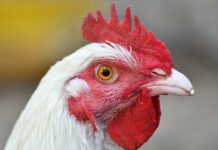
WOOSTER, Ohio — Although they both run separate farms, brothers Robert and Earl Jentes share a similar focus on conservation and taking care of the land.
The two brothers and their families jointly received this year’s cooperator award from the Wayne Soil and Water Conservation District.
Robert, 74, runs a 750-acre farm called Blue Ridge Farms, and milks 100 head of Holsteins, with help from his wife, Jan, and their adult children, Daryl and Sheryl.

The Jentes family has a rich history in Wayne County, and they trace their roots in the current neighborhood to about 1928, when their grandparents moved to the area. Most of their land is located near Jentes Road, just west of Wooster, and north along state Route 83.
Conservation practices
Earl and Robert said they learned about conservation from their parents, the late Arthur and Martha Jentes. Both brothers said one of the first things they learned was “the importance of putting tile in where it was needed.”
Both farms are well tiled, with grass waterways on the surface. Both farms also use contour strip farming where appropriate.
The strips are most noticeable at Robert’s farm, where they’ve been in use since at least the 1980s. Both farmers have widened the strips over the years, to accommodate for the larger width of today’s farm equipment, but they still make good use of this system, rotating such crops as corn, soybeans, wheat and alfalfa.
Earl calf lick
A calf licking up water at the Earl Jentes farm.
Farm and Dairy interviewed the two brothers on separate days, and both said they were surprised to receive the conservation award, but pleased with the recognition.
“I guess it’s one of those things we just did,” Earl Jentes said.
“I consider it to be somewhat of an honor, because we’ve worked at this all of our lives, to try to make the farm better and try to be good stewards of the ground,” Robert Jentes said. “The good Lord put us on the earth to be a good steward of what he put us in charge of.”
Minimum tillage
In addition to strip farming, Robert has focused on minimum tillage and no-till. Many years ago, he invested in his two favorite pieces of farm equipment — a no-till drill and a minimum tillage corn planter.
Over time, he modified the planter to include three fluted coulters, which basically acts as a strip tiller, in addition to a corn planter, all in one pass and without needing to till the whole field.
Earl also focuses on minimum tillage and no-till, and has added GPS and precision planting technology in recent years.
The brothers differ on their farm machinery preferences — Robert prefers older, but well-maintained Massey Ferguson tractors, along with a newer Fendt tractor, and Earl runs a combination, including JCB, and a New Holland. Earl’s family also runs a custom harvesting business, where they use a CLAAS silage chopper.
The brothers exchange some harvesting services, and both of their wives are active with farm bookkeeping.

The low crop and dairy prices have hurt both operations — although they say they’ve seen difficult times before.
“It’s a tough, uphill road with the way the prices are right now,” Earl said.
Earl’s son, Darren, said “it’s always been tough” and that today’s farmers probably have it better than their ancestors, but some days they aren’t so sure.
The Jentes also take good care of their farm buildings, with many original buildings still standing, including some that they built with their own sawmill, which is still in operation on Robert’s farm.
Looking ahead
Robert said farm profitability is probably one of the biggest things that will affect his children’s generation.
“My biggest concern is that the next generation can survive, and keep it going,” he said. “And in order for them to survive, these prices are going to have to turn around.”
According to Robert, it’s a matter of basic business — prices are too low and inputs too high for much of a profit margin.
“It’s not that we’re greedy,” Robert said. “But every other business in town has to make a profit, or what do they do? They shut the doors.”
Both brothers want to see a future for their farms, now operated by the fourth generation, but they also face the urban growth of Wooster, which has expanded in their direction several times in the past few decades.
Making progress
Even though both brothers have done a lot for conservation, their work is never complete. They feel pretty good about their field tiles and waterways, but there’s always room for improvement.
“Once you get to the bad places, then the places that weren’t so bad seem like bad places,” Earl said.

According to Earl, one of his favorite things about farming is the hope that next year will be better.
“Next year you always think it is going to be a better year, and then it rains every day and makes it kind of tough going, but all and all, year after year, it averages out pretty good,” he said.
One thing both brothers try to do is improve the land for their children.
“It was here when I came and I hope it’s here when they take over, and for their kids,” Earl said. “We don’t really own it — we’re just here for a little while and then it goes onto the next generation.”



























